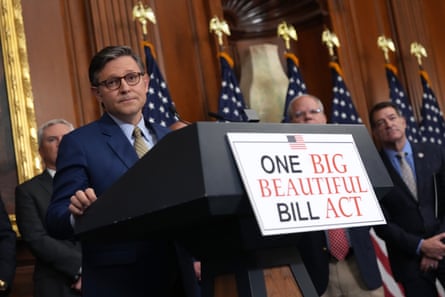Kelcy Warren was among the top donors for Donald Trump’s 2024 White House bid, personally pouring at least $5m into the campaign and co-hosting a fundraiser for the then presidential hopeful in Houston.
Trump’s win appears to already be benefiting Warren and Energy Transfer Partners, the pipeline and energy firm of which he is co-founder, executive chair and primary shareholder.
“We will be a rich nation again, and it is that liquid gold under our feet that will help to do it,” Trump said in his inaugural address.
Though domestic fossil fuel production reached record levels under Joe Biden, his policies to boost renewable energy still sparked fear among oil and gas companies, said Mark Jones, a political scientist at Rice University in Houston, Texas. “There was a threat of moving toward a net zero world … maybe not now, but there was an idea that would happen if Democrats stayed in the White House,” said Jones.
For Warren and other oil billionaires, Trump removed that fear, Jones said.
Energy Transfer Partners reported a year-over-year increase in profits in the first quarter of this year. In an earnings call last month, company top brass praised the new administration and more supportive regulatory environment.
Among Trump’s moves that have benefited the company: a day-one move to end Biden’s pause on liquefied natural gas exports, which enables Energy Transfer to proceed with a long-sought-after LNG project in Lake Charles. On 13 May, Trump’s Federal Energy Commission (Ferc) also granted a three-year extension for the LNG project, which the company said was necessary for the project to succeed.
In the week after the Ferc decision, Warren’s wealth rose by nearly 10%, noted Sarah Cohen, who directs the climate and wealth inequality-focused non-profit Climate Accountability Research Project (Carp) at the Institute for Policy Studies.
“That decision wouldn’t have been possible under Biden’s LNG pause,” said Cohen, who calculated the change using the Bloomberg billionaires index.
Since that Ferc decision, Energy Transfer Partners has also secured a 20-year deal to supply a Japanese company with up to 1m metric tons of LNG a year.
Other Trump orders to “unleash American energy” and declare an energy emergency to promote fossil fuels despite already booming production, for instance, are set to benefit Energy Transfer Partners by making it easier to expand the use all kinds of fossil fuels, thereby boosting the demand for pipelines.
Also fueling that demand: the projected boom in datacenters. Energy Transfer Partners has received requests to power 70 new ones, the Guardian reported in April, marking a 75% rise since Trump took office.

By appointing fossil fuel-friendly officials to top positions, such as the former energy CEO Chris Wright to head the energy department and the pro-oil and -gas Doug Burgum to the interior department, Trump has also “showed his allegiance to companies like Energy Transfer Partners”, said Cohen.
“They’re really creating this environment that’s great for oil and gas,” she said. “The message is ‘We’ll give you what you want.’”
Energy Transfer did not respond to requests from the Guardian to comment.
Ties to Trump
Warren ranks among the richest 500 people in the world, with Forbes placing his net worth at $7.2bn. He has long deployed his wealth to support the GOP, including by becoming the 13th-largest corporate funder to Trump’s Make America Great Again Super Pac last year with a $5m donation.
He has also spent his fortune in more eccentric ways. His $30m, 23,000 sq ft Dallas mansion includes a movie theater and bowling alley, and among his other assets are a 8,000-acre ranch near Cherokee, Texas, which is home to zebras, javelinas and giraffes; a 20,000-acre golf resort in Lajitas, Texas; a private island near Roatán, Honduras; and numerous private aircraft, including a Dassault Falcon 900 jet.
A lover of folk music, Warren also started a record label in 2007 alongside singer-songwriter Jimmy LaFave, with whom he has also written songs. “If you hear me now,” goes one song for which Warren penned the lyrics, “maybe you could pull some strings.”
The pipeline mogul accumulated most of his wealth from Energy Transfer Partners, which owns and operates about 130,000 miles of energy infrastructure in the US. In recent months, the firm has been criticized by advocates for its successful lawsuit against the environmental non-profit Greenpeace, which in March yielded a verdict that threatens to bankrupt the organization.
Warren has long enjoyed a relationship with the president, donating generously to his first campaign and attending closed-door meetings during his first term. Though Warren is not known to have attended the infamous May 2024 meeting during which Trump asked oil bosses for $1bn and pledged to overturn environmental rules, he did co-host a fundraiser for the president in Houston weeks later.
He is one of a handful of the most powerful oil billionaires from Texas, where there are no limits on contributions to candidates and political committees.
“Texas has always been kind of a testing ground for the most extreme politics and issues that the Republicans pursue,” said Matt Angle, founder of the Lone Star Project, a Democratic Pac in the state. “In Texas, people like him are used to being able to donate to get their way.”
Unlike some other Texas energy barons, such as the Christian nationalist Tim Dunn, Warren is not driven by dogma, said Jones.
“Kelcy Warren is not necessarily ideological,” he said. “He may be in sync with Trump on some other issues, but his support for Donald Trump is largely because of what Trump proposed to do [for] the energy sector.”
after newsletter promotion
One big, beautiful bill
The reconciliation bill, which the House passed last month and the Senate is now debating, is also expected to be a boon to Energy Transfer Partners and Warren. Known as the “One Big Beautiful Bill” act, it is expected to slash Biden-era incentives for renewable energy, tamping down competition in the energy market.
A number of more esoteric provisions in the bill will also prove beneficial for the company, according to a review by Carp shared with the Guardian. One provision in the House-approved version, for instance, would allow the Department of Energy to determine that a proposed LNG export facility is in the “public interest” if the applicant pays $1m – something Energy Transfer Partners could afford to do. It’s a “pay to play” scenario, said Carp co-founder Chuck Collins.

Other provisions would expedite the build-out of LNG export infrastructure, force the government to hold lease sales for fossil fuels even when demand is low and reverse protections to allow drilling in some areas without any judicial review. Still others would stymy federal agencies’ ability to implement new climate rules by requiring that major changes obtain congressional approval, allow gas developers to pay a $10m fee to bypass permitting processes, limit who can bring lawsuits over gas infrastructure and allow firms to pay taxpayers less to use public land, Carp found.
The bill is also set to hand fossil fuel companies massive tax breaks – including by extending tax cuts in the Trump-backed 2017 reconciliation bill, from which Energy Transfer Partners reported a tax benefit of $1.81bn.
In one example, the House’s version of the bill would reinstate 100% “bonus depreciation” for qualified properties, allowing companies such as Energy Transfer Partners to completely write off new infrastructure such as pipelines on their taxes, and see the benefits immediately. It’s also expected to apply to private jets, Collins noted.
Other tax breaks in the proposal are expected to personally benefit ultrawealthy Americans such as Warren.
“The most wealth I’ve ever made is during the dark times,” Warren told Bloomberg a decade ago.
Pipelines
Under Trump, Energy Transfer Partners will also likely save money on pipeline safety compliance. Since the president re-entered the White House in January, enforcement from the Pipeline and Hazardous Materials Safety Administration has dropped. Across the pipeline industry, the PHMSA opened only four enforcement actions in April, and zero in March – marking the first month since the subagency’s 2004 launch when no cases were initiated, E&E News reported.
“That fits right in with the philosophy or paradigm of the Trump 2.0 deregulation agenda,” said Carp’s Cohen.
A lack of action from the body could lead to savings for Energy Transfer Partners, which has paid millions in fines to the PHMSA.
In March, Energy Transfer Partners also sued the PHMSA, claiming that its enforcement system is “unconstitutional”. Success in the suit could mean the company is forced to pay fewer penalties.
Shielded from tariffs
Another Trump policy from which Energy Transfer Partners will benefit: an exemption for oil and gas from his new tariffs. The president provided the industry wide shield after a meeting with the American Petroleum Institute lobby group, of which Warren’s company is a member.
The firm’s profits may still be blunted by other tariffs, such as those on aluminum and other products needed for pipeline construction, but the energy sector expects those losses to be offset by the soon-to-be-passed reconciliation bill, Politico reported in April.
“The energy companies would prefer not to have the tariffs, sure,” said Jones. “But those are not a negative that outweighs what they view as the existential threat that Democrats represent … the existential threat of net zero.”

 4 hours ago
2
4 hours ago
2

















































